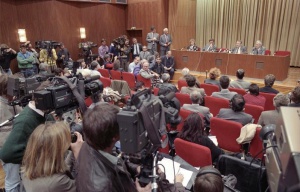The Poster Child for the Importance of Q&A Preparation
I harped last week about the critical importance of careful preparation and anticipation for the Question and Answer period after your presentation. In case that did not convince you, I’d like to introduce you to Gunter Schabowski, who made one of the most consequential gaffes in the history of Q&A.
Gunter was a member of the East German politburo who became its principal spokesperson in 1989, as Gorbachev’s reforms began inspiring eastern Europeans to test the bonds that held them in the Soviet orbit. East Germans in particular were chafing to open the borders between themselves and West Germany.
In response, the politburo had decided to open the borders under special conditions and proper permissions, in a meeting which Schabowski did not attend. He was handed a note to that effect just before his press conference on November 9, 1989. What the note did not say was that the rules would not apply to the West Berlin crossings, and that they would not take effect until the following day, to allow time to communicate the rules to the border guards.
In the press conference, Schabowski read the note out loud when he was asked (probably by Tom Brokaw) when the rules would take effect, Schabowski said: “As far as I know, effective immediately—without delay.”
Schabowski’s answer aired on West German television at 7:17pm, and thousands of East Germans rushed to the gates. As the news covered the growing crowds, more and more East Germans flocked to the border crossings. Border guards became increasingly concerned as the crowds swelled, but no one would take the responsibility to order them to fire on the crowds. Finally, at about 11:30pm, the guards simply opened the gates—and the East German regime effectively died at that moment.
What does this incident teach us about fielding questions after a presentation? The obvious lesson is that you should prepare carefully and do your best to anticipate how the audience will react to your message and what their legitimate concerns and questions might be—especially when so much is at stake.
But, (and here I’m trying to anticipate your question), the pace of events precludes careful preparation; real life does not always afford the leisure to ponder all the possible questions and objections. Sometimes you have no choice but to speak before you’re ready. That’s true, which is why sometimes your best answer is also the most honest one: “I don’t know, but I’ll find out and get back to you.”
Chances are that you will never face a Q&A where you could lose your reputation, your job and your country because of one careless answer—but are you willing to take that chance?




[…] The Poster Child for the Importance of Q&A Preparation […]